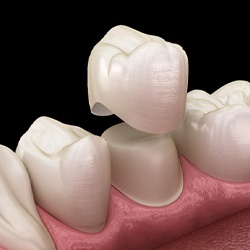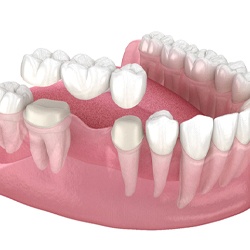Dental Crowns & Bridges – Myrtle Beach, SC
Protect and Replace Damaged Teeth

When your teeth are damaged or missing, you want a solution that can help more than just your appearance. With all-ceramic dental crowns and dental bridges from DocMark.com, you can say goodbye to dental problems and hello to a healthy smile. Dr. Jack Markusen can customize a treatment plan that suits you perfectly.
Why Choose Docmark.com for Dental Crowns & Bridges?
- BruxZir® Solid Zirconia For Outstanding Aesthetic Value
- No Physical Impressions with iTero 3D Scanner Technology
- Only A Week Of Lab Turnaround Time
What is a Dental Crown?

Unlike a filling, which is a small bit of composite resin that goes inside your tooth, dental crowns, which are also known as caps, are custom-made restorations that go over your whole tooth and are bonded to its surface.
With our all-ceramic dental crowns, you’ll get a solution looks and feels just as natural as your own tooth. We use the iTero 3D® digital scanner to take a comprehensive impression of your teeth and mouth. We then send this digital file to the lab where your restoration is created.
What is a Dental Bridge?

Dental bridges allow us to replace missing consecutive teeth or those that must be extracted due to damage. They’re often supported by neighboring teeth, which are covered with dental crowns to provide a natural-looking solution.
When Are These Restorations Recommended?

A dental crown is an ideal treatment for several dental problems, some of which include:
- Teeth weakened by tooth decay. Once we remove the infection, we can cover your tooth to protect it and offer you full functionality when eating.
- Teeth treated by a root canal. Once the infected pulp inside your tooth is removed, it will need to be covered for its own protection.
- Teeth replaced with a dental implant. Once you’ve fully healed from your implant placement, we can provide a custom-made restoration that will sit directly on top and restore the look, functionality, and health of your smile.
Regarding a dental bridge, this type of restoration is a great way to restore the overall look of your smile by eliminating the gap(s) that exist because of missing teeth. It’s also a superb solution to prevent your natural teeth from shifting and potentially result in a misaligned bite.
What is the Process of Receiving a Dental Crown or Dental Bridge?

If you’ve never gone through the process of getting a dental crown or dental bridge, you may wonder what to expect. Fortunately, the process only requires 2-3 visits to our office for proper placement.
During your first visit, Dr. Markusen will review your oral structure and determine whether you are eligible for a dental crown or bridge. Should you need a dental crown because a filling will not suffice in treating your decayed or damaged tooth, he will thoroughly clean out the tooth to remove all decayed areas before filling it with composite resin. Matching the natural color of your tooth, this substance will be bonded to your tooth using a curing light, allowing it to effectively seal the tooth from future re-infection. Once the resin hardens, he will then prep the tooth by filing it down before taking digital impressions and sending them off to a dental lab for custom creation. You will then receive a temporary crown that will be placed over the weakened tooth.
After a few weeks, you will return to have your temporary removed and your finalized restoration put into place.
A similar procedure is followed when placing a dental bridge except there is no need to clear out decayed areas of a tooth. Since bridges are recommended treatment for patients who are missing one or more teeth, all your dentist will need to do is file down the two natural teeth on either side of the gap to ensure effective placement of the bridge. After taking impressions, lab technicians will build your dental bridge based on the specifications provided by Dr. Markusen.
Much like a dental crown, you will return in a few weeks to have your finalized dental bridge cemented into place, successfully filling in the gaps of your smile.
The Benefits of Dental Crowns and Bridges

There isn’t a good reason to ignore teeth that need to be replaced or repaired, but there are several reasons to take care of your dental restorations:
- Get a smile that is strong enough to last the rest of your life!
- Improve your appearance with a more attractive smile.
- Protect your teeth from additional harm.
- Speak more clearly and with more confidence.
- Feel better about yourself.
- Eat your favorite foods without worrying about pain or discomfort.
- Prevent your remaining teeth from shifting into the area of the missing tooth.
What is the Cost for a Dental Crown & Bridge?

There is no definitive cost when it comes to dental crowns and dental bridges. Why? Because every patient is different, resulting in various factors that contribute to the overall cost of treatment. Some of the most common factors considered include:
- The severity of the original problem
- The number of teeth in need of a crown or the number of teeth consecutively missing
- Whether you require any pre-restorative treatment (i.e. periodontal therapy) to address other dental problems that could negatively affect your restorations
- Whether you will require sedation or anesthesia
- Materials used
